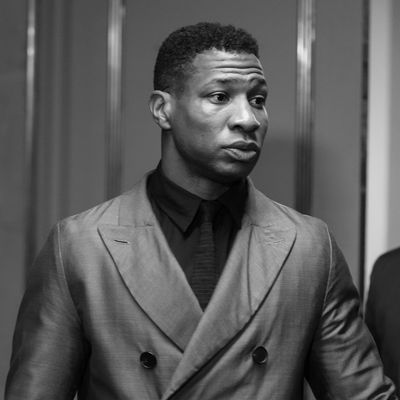
When it was time for Jonathan Majors’s ex-girlfriend, Grace Jabbari, to step down from the witness stand at the actor’s domestic-violence trial, she smiled with relief. For three full days, lawyers dissected her drinking habits, text messages, and painful moments in her relationship with the actor. She often paused to take deep breaths, and on multiple occasions, she covered her face to sob. While being forced to repeatedly watch surveillance footage from one of the worst nights of her life, she broke down and asked to leave the courtroom.
She’d seemed exasperated, heartbroken even, but never angry or vengeful. In fact, the British choreographer expressed a remarkable amount of empathy for Majors while on the stand. She described his “violent temper” as “this thing he didn’t want to have.” “I didn’t think it was malicious,” she testified. “I just felt he can’t control it.” After violent outbreaks, she told jurors, Majors said he loved her. He would also self-flagellate, calling himself as a “monster” and, on a few occasions, threatening suicide. Early on in their nearly two-year-long romance he wrote her poems, left sweet notes, and made her feel “loved and cared for.” Jabbari said that they discussed baby names and the actor called her “Mrs. Majors.” On March 24, before Majors struck her head and fractured her finger in a fight over romantic texts he received from another woman, she said the mood was “really nice and loving” as the couple had brunch in Manhattan. It’s clear from Jabbari’s testimony that she didn’t see her boyfriend as a monster.
The jury ultimately did see Majors as guilty of assaulting and harassing Jabbari. (Though he was acquitted on the two most serious charges, which involve the intent to cause physical injury, he now faces up to one year in jail). That verdict, which followed additional testimony from police officers, doctors, and witnesses from the night of the incident, stamps him as a domestic abuser. But it also flattens the complicated relationship dynamic Jabbari described into overly simplistic hero-and-villain archetypes: She was right and he is guilty.
Whether Majors was convicted or acquitted, either outcome seemed unlikely to help prevent future cycles of violence in abusive relationships. On an average day in the Manhattan criminal courthouse’s claustrophobic press room, a space plastered with yellowing tabloid covers that smells like an attic, reporters can usually be found playfully debriefing about the day’s testimony. It can be fun to speculate about whether a juror’s raised eyebrow has some deeper meaning or to poke holes in a lawyer’s argument. But over the last two weeks, the mood was somber. Most of us agreed that there was no one to root for and that the whole situation felt unfortunate.
The unusual facts of this case didn’t help to dispel our discomfort. Majors was the one who called 911 after finding Jabbari unconscious in the walk-in closet of their Chelsea apartment and told an operator that she had tried to commit suicide. When the officers started asking about her injuries, they then arrested Majors. In the aftermath of the incident, Jabbari texted the actor to say she was “angry” about his arrest. “I told them it was my fault for trying to grab your phone,” she wrote. Domestic-violence experts saw these messages as a textbook response to being gaslit by an abusive partner. “The coercive control part of this, the nonviolent part of this, is really all about positioning the perpetrator’s behavior as the victim’s fault,” advocate Carol Wick told the Daily Beast in March. But the fact remains that Jabbari didn’t call the cops; initially, she didn’t want him to be charged and had no plans to cooperate with the district attorney’s office. She decided to testify against a man who, months earlier, she thought she was going to marry, after his lawyer told the press that she lied about her injuries and that Majors himself was the victim. A self-described “very private person,” Jabbari told jurors, “The show of it all, the stuff that’s been said about me being untrue and having to take it, felt like the abuse that I was in had not ended.”
Majors’s lawyer, Priya Chaudhry, seized on the fact that Jabbari was drinking and clubbing the night of the assault to attack her credibility. She called this “revenge partying,” implying that a victim would not treat strangers to “fancy Champagne” bought with Majors’s credit card. She showed jurors a photo of Jabbari at the club, calling her “so drunk and wasted that her tongue is hanging out, and her finger is not swollen at all.” Chaudhry repeatedly slammed her hand on the lectern during closing arguments as she reduced Jabbari’s testimony to “pretty little lies” that racist cops and prosecutors bought as truth. The lawyer pointed to the fact that Jabbari had ripped a button off Majors’s coat and chased him down the sidewalk as proof that she was the aggressor.
The actor tried to present as a saint throughout his trial: reading a Bible in expensive-looking suits; kissing his new girlfriend, Meagan Good; and holding hands with his mom, who showed up to court every day. But most perpetrators don’t look or act like cartoon villains, and the specifics of Majors’s case presented an opportunity to see domestic violence through a more nuanced lens. Perpetrators can be Bible-thumping mama’s boys, thoughtful lovers, and abusive partners all at once. Jabbari said Majors would see-saw between love and aggression, sometimes in the course of a few hours. Unfortunately, the legal system doesn’t like nuance. A lawyer needs to convince jurors of their version of reality, not surface the actual truth; a lot of information gets left out in that process.
Majors’s rocky upbringing, for example, gives context for his behavior. The actor has publicly spoken about being abandoned by his father at 9 years old, getting in fights at school, and living in his car as a 17-year-old. In a New York Times interview, he described growing up with fear “pulsing through my body and that rage, that murderous frustrating, ghetto boy rage.” The judge also reportedly excluded from the trial allegations that Majors strangled a different ex-girlfriend and was emotionally abusive to another (Majors denies this). Instead, the public was banned from a hearing over sealed evidence that included these women’s testimonies, according to Rolling Stone. Thankfully, in a last-minute decision, the judge did allow jurors to read text messages Majors sent Jabbari, in which he dissuaded her from going to the hospital in a separate incident because “it could lead to an investigation.” But in most cases, contextual evidence that can give a more holistic view of an abuser’s behavior is kept out of court.
None of this is to say that Jabbari doesn’t need protection from Majors or that she didn’t feel gratitude toward the police when they came to the couple’s apartment. When they showed up, she testified that it felt like “a moment to have a bit of help in leaving the relationship.” Jabbari said she had taken Majors back after other violent outbursts, like when he threw candles against a wall, stomped on her headphones, or called her names like “idiot” and “alcoholic.” “I didn’t want to this time,” she told jurors, “but knew it would be hard.”
It’s tough to imagine safe alternatives to our legal system when it comes to such a high-stakes crime. In the U.S., women are most likely to be killed by their partners, and strangulation is a red flag that violence will escalate. But for a survivor locked in a relationship where attachment, affection, and abuse intermingle, justice might not look like facing your partner in court. For some, it might look more like a restorative-justice model, in which they can talk about how they’ve been harmed in a safe, mediated dialogue with their partner. This approach could involve ongoing case management to help deal with mental health, housing, or addiction issues. I wonder what accountability looks like for Jabbari. The day after the verdict came down, she urged people to donate to a local domestic-violence organization that “helped me so much this year.” Even in the relationship’s ugliest moments, Jabbari seemed to believe Majors wanted to change. Unfortunately, this case left little room for that transformation.





